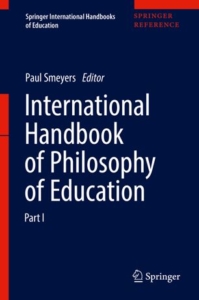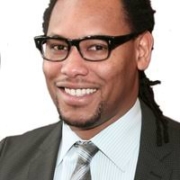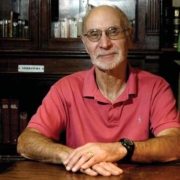 Humans have been the center of Western philosophy and science for centuries, at least since the European enlightenment. With the rise of artificial intelligence, climate change and challenges to the very idea of subjectivity, are we moving into an era that is perhaps better labeled post-human?
Humans have been the center of Western philosophy and science for centuries, at least since the European enlightenment. With the rise of artificial intelligence, climate change and challenges to the very idea of subjectivity, are we moving into an era that is perhaps better labeled post-human?
But what would posthumanism mean for education?
My guest today is Stefan Herbrechter. A research fellow at Coventry University and a Privatdozent at Heidelberg University, Stefan has a new book chapter entitled “Posthumanist Education?” published in the International Handbook of Philosophy of Education.
Citation: Herbrechter, Stefan, interview with Will Brehm, FreshEd, 123, podcast audio, July 16, 2019. https://www.freshedpodcast.com/stefanherbrechter/
Transcript, translation, and resources:
Will Brehm 1:18
Stefan Herbrechter, welcome to FreshEd.
Stefan Herbrechter 1:21
Well thanks, Will, thanks for having me on the show.
Will Brehm 1:23
How would you define posthumanist thinking?
Stefan Herbrechter 1:29
If you look at the word “post-human-ism”, it contains three elements: there’s the human in the middle, there’s the post in front of it, and there’s an ism at the end. An “ism” usually tells you it’s a discourse like humanism is also a discourse in the sense that everything that is being said about the human, or in order to make sense of the human, is part of that discourse. And posthumanism would therefore be a discourse about what it means no longer to be human, in a humanist sense. So I think that’s the minimal definition I would give at the moment to start with, but of course, this has a lot of profound implications, of course, and defining is always a very, very violent gesture. So it’s an evolving thing. It basically means we’re no longer happy with traditional ways of defining what it means to be human. That’s maybe my zero degree definition of the term.
Will Brehm 2:40
So maybe to unpack this idea of posthumanist thinking, it seems like we might have to start with humanist thinking. So, what is humanist thinking?
Stefan Herbrechter 2:56
Yes it depends really, when you want to let humanism start. I mean, there’s Renaissance humanism… So, 14th, 15th century developments where we move towards an anthropocentric world picture. The Renaissance is all about taking the focus away from God to man. And so it becomes a legitimate interest to produce knowledge about who we are, what you know, without looking towards religion. So, it’s the beginning of modern science, it’s the beginning of a certain species self centeredness, if you want. So that’s one way to begin the history of humanism: so humanism is that historical development, or this worldview that connects with the shift from the Middle Ages to the Renaissance and the long version of modernity. Then there’s a, let’s say, more closely defined humanism, that is connected with developments in science itself, and a move away from the last remainders of religion and connected to, let’s say, a new form of legitimating knowledge about who we are only through modern science. S it’s connected to a radical secularism. For example, Richard Dawkins, would be a humanist in this sense, and biological evolution tends to define us as exceptional in regard to other species, for example, but that’s a later development. And I think today in the 20th and 21stcentury, there’s a kind of humanism that is very much focused on human rights and that’s a reaction to the inhuman experiences that took place in the two world wars. So it’s a direct reaction to that: some kind of preserving the sanctity of human beings. So humanism is itself a very ambiguous and very let’s say contradictory discourse which works with the notion of what a human being is that is based on what might be exclusive to human beings, because it is not, or at least not entirely, an animal; it is not a machine and so on. So there’s a couple of things, call them problems, call them conceptual problems with humanism that precisely provoke a posthumanist reaction to it.
Will Brehm 5:46
Is posthumanist thinking based on similar exclusions that humanist thinking is? So, you said, not animals, not man, and maybe not God. Does posthumanist thinking operate in similar exclusions?
Stefan Herbrechter 6:04
The prefix post, I think, is a funny animal, we noticed that during the discussion about postmodernism and postmodernity. It’s not just a straightforward attempt to move on, or to oppose or to overcome. A post can’t do that. I understand than the prefix post is more like a, let’s say, a signal that there is (for want of a better word) an ongoing deconstruction of that which is being posted. It’s maybe a kind of parasite that inhabits humanism itself, and tries to bring it to address its own contradictions. And so posthumanism is not really defined against anything else. It incorporates humanisms and tries to push them to some kind of edge where humans would have to put their cards on the table and address their own exclusions address their own contradictions. And that’s how deconstruction is usually understood. And the idea is to maybe not so much overcome humanism, but actually break it up, for something else to be able to take place, in order to get out of humanism, which is not an easy thing to do. As you can imagine, a 500 year old worldview is not going to be superseded or abolished within a few days, you have to work with the cracks and the contradictions that are within this discourse, and try and break that open for something else, something entirely different maybe, to start happening. A new, completely new understanding of what it means to be human that is not based on the traditional exclusions. Now, that means that, of course, the old others against which we have defined ourselves are not going away, the machine is with us, it takes on new forums, the environment, the planet is around us, even God is still around as an idea. So it’s not as if these disappear, right? But the relationship with these entities is radically changing. And that which calls for, let’s say, a new self-understanding of humans, which is maybe based on more benign definitions and different relationships with these others that have always been used in order to reassure ourselves. These others are coming back to haunt us and we need to address this process, basically.
Will Brehm 8:54
Could we talk about one of these “others”? I mean, maybe the machine. You know, in humanist thinking, you were saying that humans are not machines, but in posthumanist thinking, we have to re-evaluate, re- or deconstruct what that exclusion means for what it means to be human. So how are some people in posthumanists thinking conceptualizing machine – human relationships, interactions?
Stefan Herbrechter 9:27
In order to start answering that question, let me go back to the Renaissance because our humanist understanding of machines is full of contradictions. If you read Descartes, just as an example (he’s usually the bogeyman just put up there) the idea of being truly human is defined against the mechanical. And the animal for Descartes also actually cannot be human, because it produces mechanical reactions to its environments. Now a truly human is free, right? It’s free of this mechanicity. That’s why we need to be something radically different from the mechanical but that doesn’t make the mechanical disappear. It just displaces it and turns it into a kind of fear: fear of becoming interchangeable with a machine, for example? It’s one of the greatest fears of humans. How do you, how can you be sure you’re human and not a machine? And that only — this fear can only be addressed if you expel everything mechanic from you and produce it and project it onto something else. But that, of course, is only one part of the story. And if you look at the history of our relationship with machines, and there’s also an increasing reliance on machines. Capitalism would be impossible without mechanization. So, on the one hand, we try to radically differentiate ourselves from machines, on the other hand, we’re constantly relying more and more on machines, aligning our lives more and more closely with machines. And so this fear of the machine-becoming, being an other, coming to haunt us, coming to sort of into the self, self sameness of humans is a constant fear. And the history of philosophy and the history of culture is full of these fears. And now technology has reached a stage of development where machines are actually becoming more lively as Donna Haraway said, in her Cyborg Manifesto in 1985, than ourselves. Machines are about to develop a life of their own, it seems, and that of course, is a big threat for a humanistically defined human and that’s maybe what’s posthumanist, or what characterizes a lot of posthumanist thinking, if we let it start for a moment with Donna Haraway who I mentioned; it’s a deliberate attempt to cross this boundary — human-machine. She used the cyborg as a starting point to think about new ways of imagining that relationship between humans and machines. But not in a techno utopian way: let’s all become cyborgs or so on, but to problematize that radical difference that maybe doesn’t exist between humans and machines. And what do we do if that radical difference actually is not true? That’s I think one of the ideas, one of the ways of understanding of how posthumanism started: with Donna Haraway’s Cyborg Manifesto.
Will Brehm 13:05
Has there been other thinking about the relationship between humans and machines other than Donna Haraway? I hear her name quite often. But you know, that was 1985, and I’m just wondering if things have changed over the last 30 years.
Stefan Herbrechter 13:21
Obviously. Things are moving very fast, not only in terms of technological development, but also in the thinking about this process. I just mentioned Haraway because it’s such a highly symbolic and highly visible move that she made at the time. Of course, it was the time of economic Star Wars programs and so on, and the world is different now. What it signifies I think is that it was a moment that opened up a whole new space for thinking and, of course, yes, Haraway is hoping that the cyborg will open up a new idea of materialism where precisely mechanic and living organic and inorganic will actually get mixed but will produce new forms of materialist thinking about the world. There have also been new idealisms developing about new technologies. That’s where I would locate the whole transhumanist movement and all those people who tried to flip our fear of technology into a kind of enthusiasm or techno utopia, a bit like the futurists tried to do at the beginning of the 20th century, that we embrace this technological development because it can actually turn humans into enhanced beings and from an idealistic point of view can turn us into some kind of God. You always have the feeling when you read transhumanists, for example Ray Kurzweil is usually referred to here, that we can download our minds into computers and live forever, this kind of thing. They’re usually connected to ideas of disembodiment and they are usually also directed against precisely our biological, material, animal nature that these people seem to be thinking to be able to leave behind. That’s not the kind of posthumanism that I would like to develop out of Donna Haraway’s move and that’s why I’ve been referring to it and a few other people as well of course as “critical posthumanism”, as an acknowledgement that, yes, it’s definitely a shift in our thinking and in what it means to be human. But it doesn’t necessarily mean that our future lies in becoming a technological new species that hopes to overcome its embodiment. That I think, I find a rather frightening and also dangerous attitude to develop out of these changes.
Will Brehm 16:21
What does “critical posthumanism” mean to you?
Stefan Herbrechter 16:27
In the book I wrote – the original German text was published in 2009 and the translation came out in 2013 – Posthumanism: a Critical Introduction – I tried to get a handle on all these developments that have been happening specifically since Haraway and I tried to differentiate between different posthumanisms if you want. So, on the one hand, the transhumanism that I argue against; the techno utopian strand of posthumanism and that is closely associated to what in in popular culture is usually represented as posthumanism — the idea that we turn into posthumans especially in science fiction movies that we become somehow, yes, I don’t know other superhumans or something like that. Or the idea of Arnold Schwarzenegger taking off his human skin and revealing a steel inside. This is precisely the kind of cyborg that Haraway didn’t want to happen. What she had in mind, for example, were feminist versions of combinations of technology and humanity at a much more mundane level. For example, getting us out of a gendered world. Why would a cyborg have gender? I mean, if you watch Arnold Schwarzenegger you don’t have any doubt that he’s a hyper-masculine being, regardless of what his interior looks like. And why is that so? So for Haraway, the cyborg is actually a figure that could liberate us from existing prejudices and stereotypes and so on. There is a critical potential in letting go of traditional notions of what it means to be human. Technology is maybe just, let’s say, the inducement for this, but it’s not an end in itself. And it’s technological development that might have pushed us towards the need for a radical rethink of what it means to be human. But that shouldn’t maybe drive us towards thinking that technology has a dynamic of itself or is the only option. There is a posthumanism that doesn’t only look forward to some kind of techno-utopian developments but also there’s a posthumanism that throws us back to our beginnings, for example. How did we become to think of us as humans in the first place? I’m working on a project at the moment that my collaborator Ivan Callus and I have called “Before Humanity”. And there’s this whole story about us, the only surviving human species having to replace maybe even kill off other humans in order to become who we are. And that also has an ecological aspect of course. Because maybe it was climate change in the first place that made us survive, not the Neanderthals, for example. And now we’re a stage again where we have a period of climate change ahead of us or are already experiencing it, and we’re facing ourselves, or let’s say, are facing extinction ourselves. So it’s not a coincidence that all this questioning happens at a moment we are struggling to define us, including the questioning of the process of definition itself, whether defining is actually a helpful move because, as I said, in the beginning, defining is always against others. At the moment, instead, the signs are very much, let’s say, we’re in this together. Let’s not define our society against anything, because we need everybody we need the planet, we need the environment, we need machines, we need animals in order to find a way out of the mess that we’ve created. That’s where I would locate critical posthumanism. Technology, yes. But and this actually opens up wider questions about where a possible future lies.
Will Brehm 20:56
What sort of questions does it open up — It being critical humanist thinking — open up for education?
Stefan Herbrecher 21:04
There’s always been an educational aspect to posthumanism but it was often hidden.People weren’t thinking about educational implications of these new ideas that openly. But if you’re struggling to open up, or to undo a notional subjectivity that humanism has been relying on and let’s call that the “liberal humanist” self (a lot of people call it that), the idea that humans share some kind of human nature, which allows them to make more or less free decisions, or the idea of a moral human being that should recognize the innate humanity of other human beings, and therefore should take the right decision and show solidarity with other humans and so on and so on. If this sort of humanist notion of a subject is in deep problems, what to replace it with? And that, of course, strictly speaking, goes to the heart of education, doesn’t it, because we learn to be humans. I don’t think you can argue with that. People have been looking for this human nature for a long time and haven’t found it, except for, if you want to look at it in some kind of DNA. But that, as you know, is shared to 99 or so percent with other species. The idea of finding a human nature is, I think, a dead end. So how to train humans to develop a self-understanding that is not based on an idea of humanity that is exclusive or exceptional. That is a great challenge, I think, for education now, because most curricula are all about and “centering” the human. The human is always at the center of these things, of course, and how could it not be? It seems like common sense. And humans, of course, are running the world and therefore they need to be brought by education to a position where they can run this world in a way that, on the one hand, prolongs, on the other hand, legitimates their role, but of course, in a humane way. Now, if you wanted to scratch at that consensus, that this is what education is about, producing little humans, then from a posthumanist view, you’d have to start very early, wouldn’t you? You’d have to rethink the whole process of hominization that education is supposed to replicate, to perpetuate, and so on. That involves really everything. So looking at new relationships between humans and their environment, you’d have to start in primary school, maybe even before, right? The whole socialization process, if you want, needs to change. If we want to develop a new, a better, more ecological relationship with our planet for example.
Will Brehm 24:32
Given this sort of division between the techno-utopian thinking and the techno-phobic thinking that you talked about earlier, in your opinion, what is the place of technology in a critical posthumanist pedagogy?
Stefan Herbrechter 24:50
Thanks for that question, because I want to avoid the impression that critical posthumanism is technophobic. It’s not. There are, of course, profound changes to educational practice because of technological developments. The question is only what role does technology, or is technology supposed to play? And are we actually in a position to hang on to a basically utilitarian notion of technology in the sense that I use technology as a tool in order to maybe change something in education, or find new ways of, or better ways of getting through to youngsters or something like that? You often hear that, you know, the new generation is more techno-savvy than the teachers. So teachers need to use the technology in order to get through to them, and this kind of thing. I think this is a thoroughly utilitarian notion of technology, which is of course, problematic. And here I would like to refer to work that has been done by a French philosopher called Bernard Stiegler who is not the only one but maybe the most vocal advocate of what he calls “originally technicity”. Actually, at no point in the history of hominization can you reach a point where you have on the one side, the human on the other side, the technical. These two co-evolve together and they continue co-evolving. And of course, that leads to changes in the understanding of our relationship with technology in the first place, and especially at the time now, when we do have smart technologies and ever smarter technologies that do a lot of the stuff like communicating amongst themselves.
And one other way of understanding humanism, which I maybe haven’t mentioned yet, is of course, humanism as a very specific historical chapter in media history. That’s an idea maybe that you find in the work of Peter Sloterdijk who characterizes humanism as that time where you have national communities of people who write letters to themselves. That’s where the idea of literacy comes from, basically. And, of course, in a time when people don’t write letters anymore, not just in the sense that they don’t stick paper into an envelope and send each other letters, instead, they do email. You have completely new forms of communication that, especially new social media, enable. And that, of course, does not only add something to something existing, it completely changes human lives in the sense that new forms of communities are possible and also new forms of cognitive developments like distributed cognitive environments where not only humans do the thinking. A lot of the thinking is being done by machines for us and that’s not only a spooky or negative effect, of course. It opens up incredible possibilities. So posthumanist education is also that: an education that is no longer humanist in the old sense, maybe the Humboldt sense, of the personal development of a human being through literacy. And the very term “literacy” might not be appropriate anymore because it’s not about letters. It’s not about the literal. It’s not about letteredness. It’s about maybe more, what I try to explain by using the word “mediacy”: being closer and cohabiting not only using but also being used to a certain extent by media. And that, of course, is not just language, our first medium, but all these other more technological media that now exist. So that also is posthumanism, but not, as I said, in a in a wildly techno-utopian sense. But we need to keep a critical handle on this. And therefore we need to be able to build bridges between the old and the new paradigm if you want. That’s what critical posthumanism is trying to do, from a political and an educational point of view.
Will Brehm 29:31
Stefan Herbrechter, thank you so much for joining FreshEd.
Stefan Herbrechter
Thanks, Will. Thanks for having me.
Want to help translate this show? Please contact info@freshedpodcast.com
Have any useful resources related to this show? Please send them to info@freshedpodcast.com
What is Critical Posthumanist Education?










